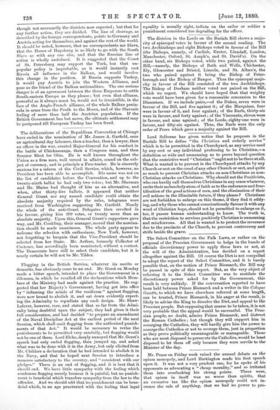The deliberations of the Republican Convention at Chicago have ended
in the nomination of Mr. James A. Garfield, once an agricultural day labourer, then a teacher, then a lawyer, then an officer in the war, created Major-General for his conduct in the battle of Chickamauga, then a Congress man, and then Senator Elect for Ohio. He is well known throughout the Union as a firm man, well versed in affairs, sound on the sub- ject of currency, and in principle a Free-trader. He is sincerely anxious for a reform of the Civil Service, which, however, no President has been able to accomplish. His name was not on the list of candidates before the Convention, and up to the twenty-ninth ballot he had only two votes ; but Mr. Sherman and Mr. Blaine had thought of him as an alternative, and when, after thirty-five ballots, it appeared that neither General Grant nor any named candidate could obtain the absolute majority required by the rules, telegrams were received from Washington suggesting Mr. Garfield. Nearly the whole of the anti-Grant Delegates then revolted in his favour, giving him 399 votes, or twenty more than an absolute majority. Upon this, General Grant's supporters gave way, and Mr. Conkling, their manager, moved that the nomina- tion should be made unanimous. The whole party appear to• welcome the selection with enthusiasm, New York, however, not forgetting to bargain that the Vice-President should be selected from her State. Mr. Arthur, formerly Collector of Customs, has accordingly been nominated, without a contest. The Democrats have still to select their candidate, but it is nearly certain he will not be Mr. Tilden.


































 Previous page
Previous page